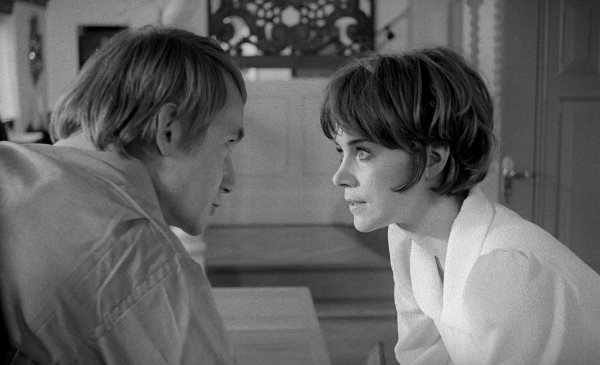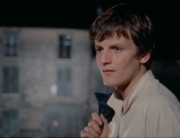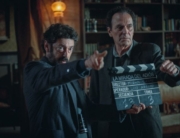
When a young man enters a house of secrets, he discovers the Sartrean maxim, “Hell is other peo8le.” Celebrated intellectual Susan Sontag’s 1969 film debut ventures into enigmatic, perilous mind games between two couples, functioning on one hand as an artsy 1960s curio, and on another as an intriguing premonition of the shifty age we inhabit now.
Fifteen years after her death, cognoscenti still debate Sontag’s literary output, cultural influence, and even her hairdo, so Duet for Cannibals will likely fall under the same scrutiny. The film can be initially hard going. Shot in a crisp Bergman-esque black-and-white, it unfolds at times like a stage play. Dialogue in Swedish, slips into fantasy, and longueurs where the actors seem unsure what to do may test some viewers’ patience. But sticking with this oddly insinuating psychological semi-thriller offers an atmospheric pull and plenty of ideas to chew over.
Tomas (Gösta Ekman) has just taken a job as an archivist and aide to Artur Bauer (Lars Ekborg), a German leftist leader in exile who insists that Tomas live with him and his wife, Francesca (Adriana Asti), for the duration of their project. Strange incidents start to take place in the couple’s comfortably bourgeois home. Bauer bedevils Tomas with high-handed, contradictory instructions. Part Circe, part sphinx, Francesca leads Tomas on in moody teases, tacitly approved or abruptly shot down by her husband. Tension, frustration, and puzzlement mount as Tomas is inveigled deeper into the pair’s dramas. Tomas’s gamine girlfriend Ingrid (Agneta Ekmanner) sensibly insists that he extricate himself from the bizarre ménage. But can she withstand the consuming force field of this household herself?
Duet leavens heavy Scandinavian-style symbolism with moments of deadpan humor and absurdity. The film’s tastefully minimalist interiors, allusions to Simone de Beauvoir and Ho Chi Minh, and a certain awkward balance of staginess and capriciousness in the performances—Asti’s particularly—root it firmly in the 1960s. In an unwelcome throwback, so do several scenes of men straightening out wayward women with manly slaps.
At the same time, Duet offers prescient peeks at our own era of surveillance, voyeurism, and identity-switching. The stress of living in a controlled environment rings emotionally true, an episode of Stockholm syndrome less so, but it’s chilling in its own weird way anyhow. When Death appears, it could be a final reckoning—or a final ruse. Opaque, allegorical, and sometimes unnerving, Sontag’s film will reward the viewer who allows ideas to circulate and then settle in unexpected ways.






Leave A Comment